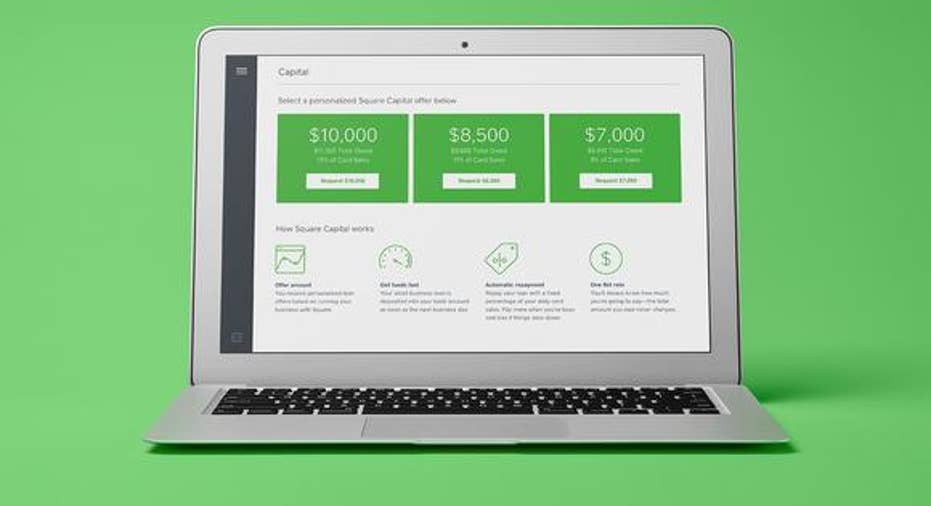Square Is Expanding Its Most Profitable Business

One thing has become abundantly clear about Square's business since it went public: the payments business has a fixed and relatively low margin. If Square plans to become profitable, it needs to leverage its well-established payments business with its other services -- which are currently clumped together in its software and data group.
One of the earliest businesses in that segment is Square Capital, a division that supplies cash advances to businesses that use Square's payments and payroll dashboard. Recently, the company expanded Square Capital to include flexible bank loans (backed by Celtic Bank in Utah). The move opens more opportunities for Square to capitalize on the data it has on the small and medium-sized businesses using its platform.
Image source: Square.
More loans are good for SquareSquare Capital doesn't back the loans it originates. It simply collects a fee for facilitating everything. As such, the business carries relatively low risk for Square and its investors.
With its new flexible loans option, Square is taking on a small portion of the loans itself. Square officially says it's because "We want to show investors we're willing to put skin in the game," but more likely it's part of the terms with Celtic Bank. Regardless, the plan is to securitize the loans by bundling them up into nice little packages and selling them to investors.
Square will use the data it already has on businesses using its payments platform to determine the credit-worthiness of businesses. Square has access to daily sales, payroll data, inventory, and several other data points that help it get a better idea of a business' ability to pay back a loan than most banks could get with a credit check. That factor should help further improve the risk-reward ratio for Square.
Most important for investors is the fact that Square Capital's operations carry a much higher gross margin than payment processing. Over the past three years, Square's payment processing business has consistently generated a gross margin around 36%. While Square doesn't break out Square Capital revenue on its own, its software and data business generated a gross margin of 61%.
Avoid overexpansionWhile Square's decision to expand into flexible loans looks good on paper, the company risks attempting to grow the business too much and making loans to riskier borrowers. That's a symptom that's plagued the online lending market in recent years, as exemplified by LendingTree .
LendingTree, the online loan marketplace, said it helped facilitate 761% more loans to subprime borrowers in 2014 compared to 2013. In fact, data from the company indicate that LendingTree and other online lenders are helping create an auto loan bubble.
But business loans are much harder to qualify for than auto loans and other consumer loans, leaving a valuable market for Square and other companies like PayPal to tap. Following the financial crisis in 2008, banks restricted access to capital, disproportionately impacting small and medium-sized businesses. The number of loans to businesses with less than $1 million in annual revenue fell dramatically from 2007 to 2013.
PayPal is already taking advantage of the market. Last year, it says it extended over $1 billion in working capital loans to small businesses using its payments platform. Comparatively, Square Capital only sent out $400 million in cash advances last year.
As mentioned, Square has a lot of data on businesses that use its payment processing services, which it can use to reduce risk. At this point, there's no reason for Square to overextend itself, especially considering it's taking on part of the loans it's originating. But the potential exists, which investors will have to keep an eye on as Square Capital becomes a larger part of its business. Software and data currently only account for about 5% of Square's revenue, but it's growing fast and Square is continually adding new products to the division.
The article Square Is Expanding Its Most Profitable Business originally appeared on Fool.com.
Adam Levy has no position in any stocks mentioned. The Motley Fool owns shares of and recommends PayPal Holdings. Try any of our Foolish newsletter services free for 30 days. We Fools may not all hold the same opinions, but we all believe that considering a diverse range of insights makes us better investors. The Motley Fool has a disclosure policy.
Copyright 1995 - 2016 The Motley Fool, LLC. All rights reserved. The Motley Fool has a disclosure policy.



















